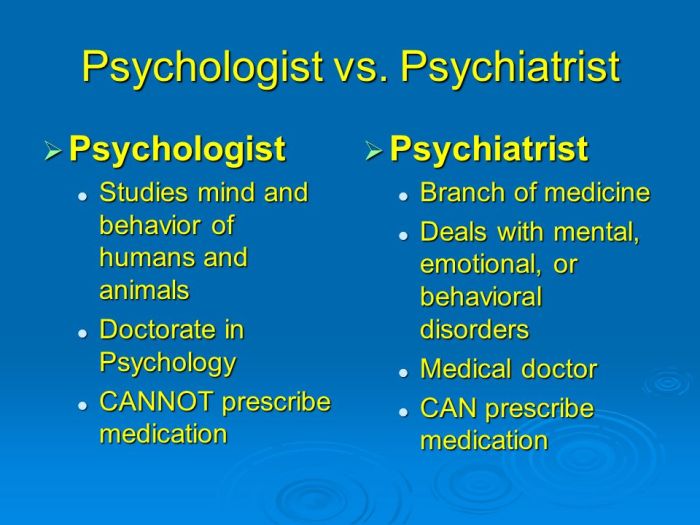A clinical psychologist or psychiatrist practicing _____ might _____. – A clinical psychologist or psychiatrist practicing within their respective fields plays a pivotal role in addressing mental health concerns. Their distinct roles, treatment approaches, and collaborative efforts shape the landscape of mental health care, providing comprehensive support for individuals seeking professional help.
Clinical psychologists and psychiatrists, while sharing the common goal of improving mental well-being, differ in their training and scope of practice. Psychologists hold doctoral degrees in psychology, specializing in the assessment, diagnosis, and treatment of mental health conditions through psychotherapy and counseling techniques.
Psychiatrists, on the other hand, are medical doctors who have completed medical school and specialized in psychiatry, enabling them to prescribe medications and provide medical interventions in addition to psychotherapy.
Understanding the Scope of Practice: A Clinical Psychologist Or Psychiatrist Practicing _____ Might _____.

Clinical psychologists and psychiatrists are both mental health professionals who provide diagnosis and treatment for mental disorders. However, there are some key differences between the two professions.Clinical psychologists typically have a doctorate in psychology (PhD or PsyD) and have completed an internship and postdoctoral fellowship in clinical psychology.
They are trained in the assessment, diagnosis, and treatment of mental disorders using psychotherapy techniques. Psychiatrists, on the other hand, are medical doctors (MDs) who have completed a residency in psychiatry. They are trained in the assessment, diagnosis, and treatment of mental disorders using both psychotherapy and medication.Clinical
psychologists typically treat a wide range of mental health conditions, including anxiety disorders, depression, eating disorders, personality disorders, and substance use disorders. Psychiatrists also treat a wide range of mental health conditions, but they are more likely to treat severe mental illnesses, such as schizophrenia, bipolar disorder, and major depressive disorder.There
are a number of legal and ethical considerations involved in practicing psychology and psychiatry. Both clinical psychologists and psychiatrists must be licensed by the state in which they practice. They must also adhere to the ethical guidelines of their respective professions.
Key Questions Answered
What is the difference between a clinical psychologist and a psychiatrist?
Clinical psychologists focus on the assessment and treatment of mental health conditions through psychotherapy and counseling techniques, while psychiatrists are medical doctors who can prescribe medications and provide medical interventions in addition to psychotherapy.
What are some common mental health conditions treated by clinical psychologists and psychiatrists?
Clinical psychologists and psychiatrists commonly treat conditions such as anxiety disorders, depression, bipolar disorder, schizophrenia, and personality disorders.
How do clinical psychologists and psychiatrists collaborate with other healthcare professionals?
Clinical psychologists and psychiatrists work closely with other healthcare professionals, such as social workers, nurses, and primary care physicians, to provide comprehensive care for individuals with mental health concerns.


